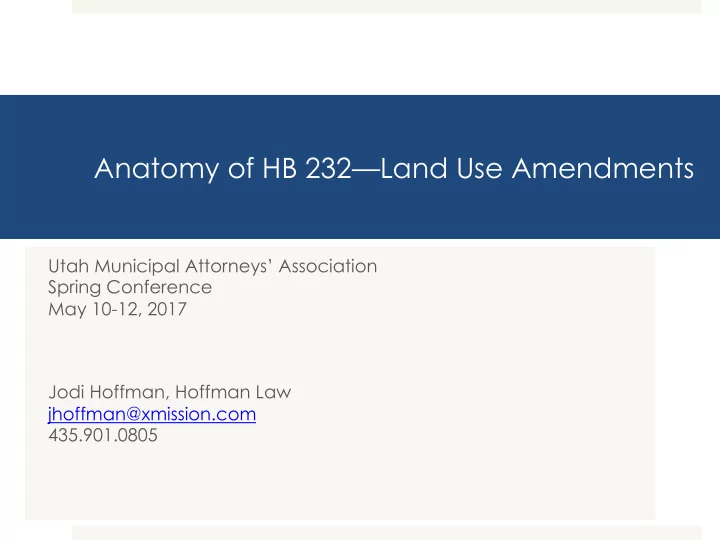

Anatomy of HB 232—Land Use Amendments Utah Municipal Attorneys’ Association Spring Conference May 10-12, 2017 Jodi Hoffman, Hoffman Law jhoffman@xmission.com 435.901.0805
LUDMA Themes 2017: 1. Broad Discretion to Regulate Land Use : City Councils have broad discretion to regulate the use of private property. (Just do it!) 2. Narrow Administrative Discretion: Land use authority is bound by the terms and standards of applicable land use ordinances and shall comply with the provisions of those ordinances. 3. Property Rights Restricted Only With Plain Regulations: Individuals are free to use private property as they wish, unless validly enacted land use laws plainly restrict their use.
Constitutional Separation of Power Structural Preserves Legislative Fundamental Freedoms: Checks and Balances Offsetting Roles Accountability Judicial Executive
LUDMA: Imposes Municipal Separation of Power Structural Separation Council of Powers Preserve Fundamental Freedoms: Checks and Balances Offsetting Roles Land Accountability Appeal Use Authority Authority
The Language of Legislative Power vs. Administrative Power Since 2005 Pre-2005 LUDMA revisions– Must approve if conditions can substantially mitigate detrimental “May approve, deny or effects to comply with applicable approve with conditions” standards. Legislative power Administrative power
HB 232 Land Use Amendments Most local jurisdictions are unaware of fundamental distinctions between legislative and administrative decision making in the land use context. Many legislative bodies prefer to “administer” unclear rules instead of enacting plain regulations Many land use authorities administer land use regulations with legislative discretion Many jurisdictions allow staff to “legislate” land use regulations Many appeal authorities and courts don’t distinguish administrative and legislative acts and functions
Form And Process After HB 232 10-9a-103. Definitions (28) "Land use regulation”: (a) means an ordinance, law, code, map, resolution, specification, fee, or rule that governs the use or development of land; ¤ All land use regulations must be enacted after a public hearing, planning commission recommendation and council action ¤ Jurisdictions have allowed staff to adopt land use regulations and have delegated legislative discretion to land use authorities
Scope and Limits of Legislative Power 10-9a-104. Stricter requirements or higher standards . (1) Except as provided in Subsection (2), a municipality may enact [an ordinance] a land use regulation imposing stricter requirements or higher standards than are required by this chapter. (2) A municipality may not impose [stricter requirements or higher standards than are required by:] a requirement or standard that conflicts with a provision of this chapter, other state law, or federal law.
Limits Of Administrative Discretion; Plain language rule: 10-9a-306. Land use authority requirements -- Nature of land use decision. (1) A land use authority shall apply the plain language of land use regulations. (2) If a land use regulation does not plainly restrict a land use application, the land use authority shall interpret and apply the land use regulation to favor the land use application. (3) A land use decision of a land use authority is an administrative act, even if the land use authority is the legislative body.
Common Law Rules of Interpretation 1. Land Use Restrictions are “strictly construed” in favor of an applicant’s common law right to unrestricted use of property. 2. Ambiguous land use restrictions are construed in favor of the proposed use. 3. A land use restriction is ambiguous if it can be understood by reasonably well-informed persons to have different meanings. 4. A land use restriction does not prohibit a proposed land use if a reasonably well-informed person could interpret the restriction, or another applicable regulation, to allow the land use. Practice Tip: Replace reliance on: “the Planning Director shall interpret . . . this code,” with a restatement of 10-9a-306.
(26) "Land use decision" means a final action of a land use authority or appeal authority regarding: (a) a land use permit; (b) a land use application; or (c) the enforcement of a land use regulation, land use permit, or development agreement. (24) "Land use application”: (a) means an application that is: (i) required by a [municipality's land use ordinance.] municipality; and (ii) submitted by a land use applicant to obtain a land use decision; and (b) does not mean an application to enact, amend, or repeal a land use regulation. (23) "Land use applicant" means a property owner, or the property owner's designee, who submits a land use application regarding the property owner's land. (28) “Land use regulation” does not mean: (ii) a land use decision of the legislative body acting as the land use authority, even if the decision is expressed in a res or ordinance;
Accountability-Appeal Authority-- Plain Meaning Appeal Authority: 10 - 9a - 707 . (4) The appeal authority shall: (a) determine the correctness of [a decision of] the land use [authority in its] authority's interpretation and application of [a] the plain meaning of the land use [ordinance.] regulations; and (b) interpret and apply a land use regulation to favor a land use application unless the land use regulation plainly restricts the land use application. (5) An appeal authority's land use decision is a quasi-judicial act, even if the appeal authority is the legislative body.
Accountability-District Court— Correctness/Illegality District Court: 10 - 9a - 801 . Land Use Decisions (3)(b) A court shall: (i)presume that a final decision of a land use authority or an appeal authority is valid; and (ii) uphold the decision unless the decision is: (A)arbitrary and capricious; or (B) illegal. (c) (i) A decision is arbitrary and capricious unless the decision is supported by substantial evidence in the record. (ii) A decision is illegal if the decision is: (A) based on an incorrect interpretation of a land use regulation; or (B) contrary to law
Recommend
More recommend